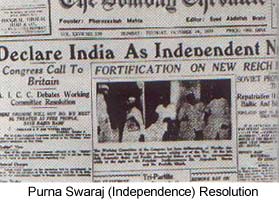

 |  |
 Meanwhile, the publication of the report of the Simon Commission, which contained no mention of Dominion Status and was in other ways also a regressive document, combined with the repressive policy, further upset even moderate political opinion. Madan Mohan Malaviya and M.S. Aney courted arrest. In a conciliatory gesture, the Viceroy on 9 July suggested a Round Table Conference and reiterated the goal of Dominion Status. He also accepted the suggestion, made by forty members of the Central Legislature, that Tej Bahadur Sapru and M.R. Jayakar be allowed to explore the possibilities of peace between the Congress and the Government. Meanwhile, the publication of the report of the Simon Commission, which contained no mention of Dominion Status and was in other ways also a regressive document, combined with the repressive policy, further upset even moderate political opinion. Madan Mohan Malaviya and M.S. Aney courted arrest. In a conciliatory gesture, the Viceroy on 9 July suggested a Round Table Conference and reiterated the goal of Dominion Status. He also accepted the suggestion, made by forty members of the Central Legislature, that Tej Bahadur Sapru and M.R. Jayakar be allowed to explore the possibilities of peace between the Congress and the Government. In pursuance of this, the Nehrus, father and son, were taken in August to Yeravada jail to meet Gandhiji and discuss the possibilities of a settlement. Nothing came of the talks, but the gesture did ensure that some sections of political opinion would attend the Round Table Conference in London in November. The proceedings in London, the first ever conducted between the British and Indians as equals, at which virtually every delegate reiterated that a constitutional discussion to which the Congress was not a party was a meaningless exercise, then an olive branch to the Congress was imperative. The British Prime Minister hinted this possibility in his statement at the fusion of the Round Table Conference. He also expressed the hope that the Congress would participate in the next round of deliberations to be held later in the year. On 25 January, the Viceroy announced the unconditional release of Gandhiji and all the other members of the Congress Working Committee, so that might be to respond to the Prime Minister's statement 'freely and fearlessly'. next page >> |
Copyright ©2000 indiansaga.info. All rights reserved.
By using this service, you accept that you won't copy or use the data given in this website for any commercial purpose.
The material on indiansaga.info is for informational & educational purpose only.
This site is best viewed at 800 X 600 picture resolution.